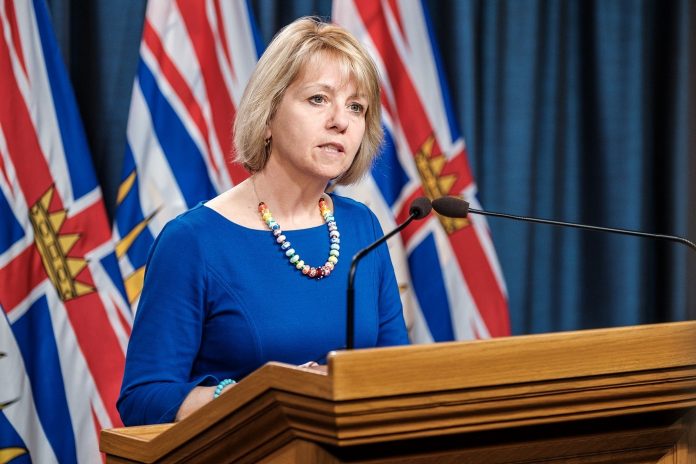HEALTH Minister Adrian Dix and Provincial Health Minister Dr. Bonnie Henry on Monday, providing COVID-19 case updates for two 24-hour reporting periods – April 18 to 19, and April 19 through to midday today – announced that B.C. had 29 new cases in the first reporting period and a further 23 new cases in the last 24 hours, for a total of 1,699 cases in British Columbia.
Every health region in British Columbia has patients with COVID-19: 700 are in the Vancouver Coastal Health region, 705 are in the Fraser Health region, 102 are in the Island Health region, 153 are in the Interior Health region and 39 are in the Northern Health region.
There were five new COVID-19 related deaths, three in the first reporting period and two since yesterday, for a total of 86 deaths in British Columbia.
There has been one new outbreak at the Chartwell Willow long-term care facility in the last day. In total, 20 long-term care and assisted-living facilities, and one acute-care unit have active outbreaks. Outbreaks have been declared over at six facilities, in addition to the provincial Okanagan Correctional Centre.
There are now 75 cases of COVID-19 associated with the Mission Institution federal correctional centre. Fraser Health officials continue to work with Correction Services Canada to manage this outbreak.
Dix and Henry added: “We have also seen a number of new cases of COVID-19 in B.C. related to the Kearl Lake project near Fort McMurray, Alberta. Anyone who was at the site from March to present is ordered by the provincial health officer to immediately self-isolate for 14 days and contact your primary care provider, 811 or local public-health teams.
“The guidance we have in place for work camps clearly outlines how to safely operate, and what should be done in the event of a positive case of COVID-19. It is important that employers and workers continue to follow these guidelines to stay safe.”
To date, 1,039 people who had tested positive for COVID-19 have recovered and no longer require isolation.
Of the total COVID-19 cases, 104 individuals are currently hospitalized, 49 of those are in intensive care and the remaining people with COVID-19 are recovering at home in self-isolation.
They said: “Today, the Premier announced a new framework to provide additional support to our rural, remote and Indigenous communities. This framework recognizes and proactively supports communities that may have limited access to the level of health care that we find in larger, urban centres.
“The framework provides more in-community support and testing, faster access to primary and urgent care, and other important social supports. This will enhance our province’s ability to provide care to all British Columbians and keep our communities safe, as we continue to do all we can to break the chain of transmission.
“As the situation within B.C. evolves, our testing strategy evolves with it. Initially, our approach was to understand the source of transmission by testing returning travellers, in addition to using community surveillance testing through our ongoing influenza response.
“As widespread community transmission occurred, we adjusted our testing to focus on our highest risk and most vulnerable people. This includes outbreaks in long-term care, people who are critically ill and our health-care workers, whose important responsibility it is to care for all of us.
“We are now using testing to help us quickly identify and address any new community clusters and outbreaks that may emerge. We want to avoid another spike in new cases and continue to flatten our curve.
“What this means is that anyone with COVID-19 symptoms can now be assessed and tested through a physician, nurse practitioner or a local community collection centre.
“We remind everyone that while testing is now broadly available, not everyone needs a test. If you have no symptoms, the test has limited benefit.
“We are not through the storm. We must remain vigilant to protect loved ones, elders and all of our communities. We will continue to take a slow and thoughtful approach, learning from other jurisdictions that are farther along, while staying alert to changes here in B.C.
“We can only introduce modifications to the orders we have in place with further improvement and with all us remaining 100% committed. Let’s stay strong.”













